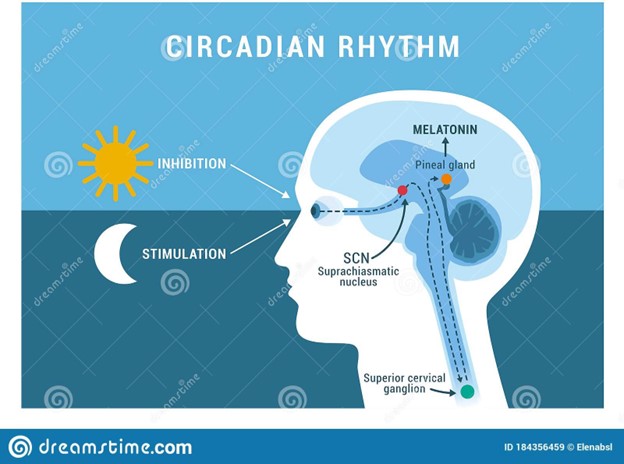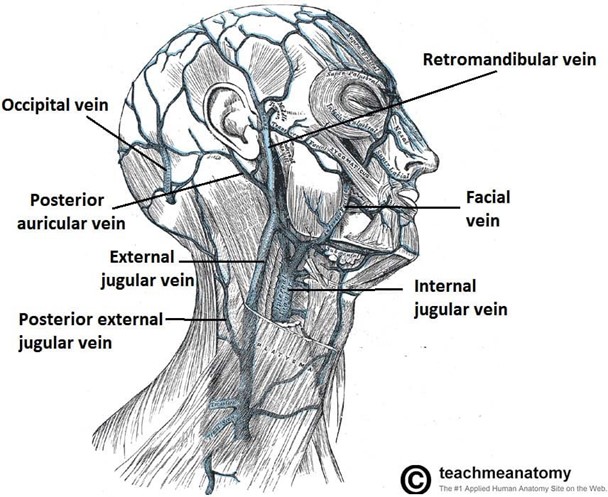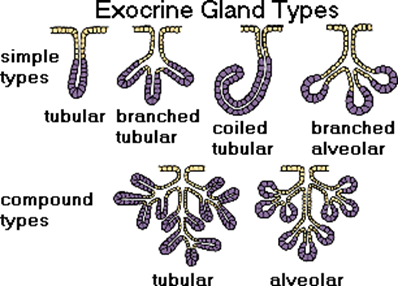A night-shift worker experiences extreme difficulty falling asleep due to being exposed to bright lights during both night and day.
The unusual pattern of light exposure is disturbing which controls the release of the hormone:
Metabolic rate; thyroxine.
Limbic system; thymosin.
Circulatory system; dopamine.
Circadian rhythm; melatonin.
The Correct Answer is D

Circadian rhythm is the term for the biological clock that regulates the sleep-wake cycle and other physiological processes in the body.
Melatonin is a hormone that is produced by the pineal gland in the brain in response to darkness.
It helps with the timing of the circadian rhythm and promotes sleep.
Choice A is wrong because metabolic rate is not affected by light exposure, and thyroxine is a hormone that regulates metabolism, not sleep.
Choice B is wrong because the limbic system is a part of the brain that is involved in emotions, memory, and motivation, not sleep.
Thymosin is a hormone that stimulates the development of T cells, which are part of the immune system.
Choice C is wrong because the circulatory system is the system of blood vessels and organs that transport blood throughout the body, not a part of the brain that controls sleep.
Dopamine is a neurotransmitter that is involved in reward, motivation, and movement, not sleep.
Nursing Test Bank
Naxlex Comprehensive Predictor Exams
Related Questions
Correct Answer is C
Explanation

This is because the external jugular vein drains blood from the face and scalp into the subclavian vein.
Some possible explanations for the other choices are:
Choice A. Superior vena cava.
This is wrong because the superior vena cava is a large vein that collects blood from the head, neck, chest, and upper limbs and returns it to the right atrium of the heart.
It does not drain blood from the face and scalp directly.
Choice B. Subclavian vein.
This is wrong because the subclavian vein is a vein that receives blood from the external jugular vein, the internal jugular vein, and the vertebral vein and joins with the internal thoracic vein to form the brachiocephalic vein.
It does not drain blood from the face and scalp directly.
Choice D. Cephalic vein.
This is wrong because the cephalic vein is a vein that runs along the lateral side of the arm from the hand to the shoulder and empties into the axillary vein.
It does not drain blood from the face and scalp at all.
Normal ranges for blood pressure vary depending on age, gender, health status, and other factors, but a general guideline is that systolic blood pressure (the pressure when the heart contracts) should be less than 120 mmHg and diastolic blood pressure (the pressure when the heart relaxes) should be less than 80 mmHg.
Correct Answer is D
Explanation
Exocrine glands secrete through ducts or tubes to the body’s exterior.

For example, sweat glands, salivary glands, and liver are exocrine glands.
Choice A is wrong because exocrine glands do not only secrete salts, but also other substances such as enzymes, mucus, and sebum.
Choice B is wrong because exocrine glands do not secrete hormones at all.
Hormones are secreted by endocrine glands, which are ductless glands that release their products directly into the bloodstream.
Choice C is wrong because exocrine glands do not secrete into the bloodstream, but onto an epithelial surface such as the skin or the gastrointestinal tract.
Only endocrine glands secrete into the bloodstream.
Whether you are a student looking to ace your exams or a practicing nurse seeking to enhance your expertise , our nursing education contents will empower you with the confidence and competence to make a difference in the lives of patients and become a respected leader in the healthcare field.
Visit Naxlex, invest in your future and unlock endless possibilities with our unparalleled nursing education contents today
Report Wrong Answer on the Current Question
Do you disagree with the answer? If yes, what is your expected answer? Explain.
Kindly be descriptive with the issue you are facing.
